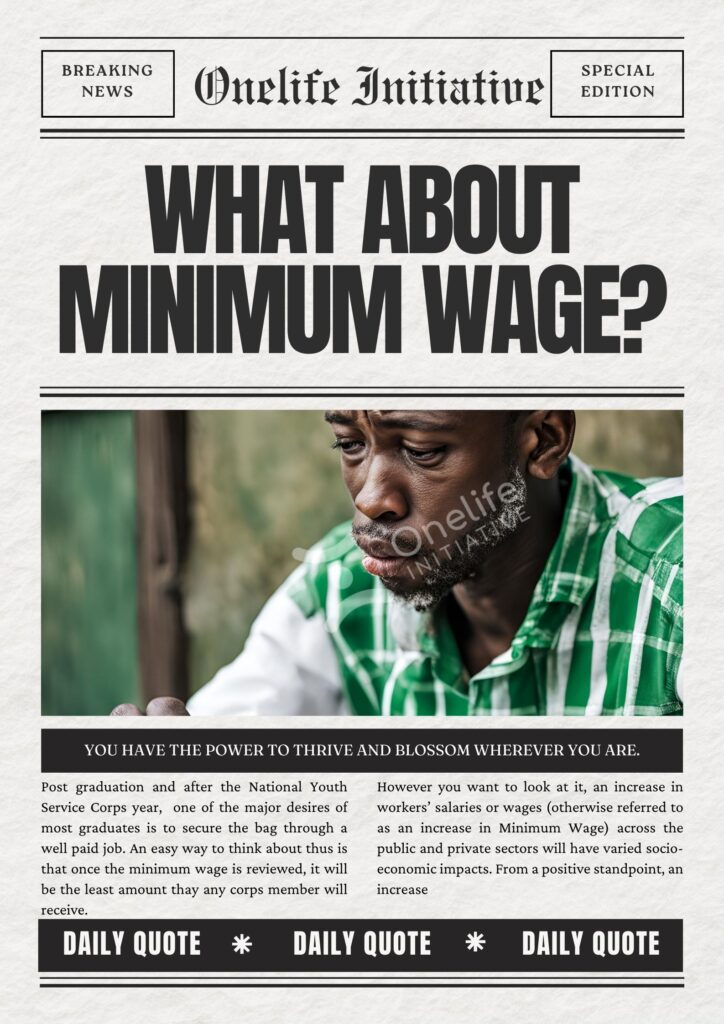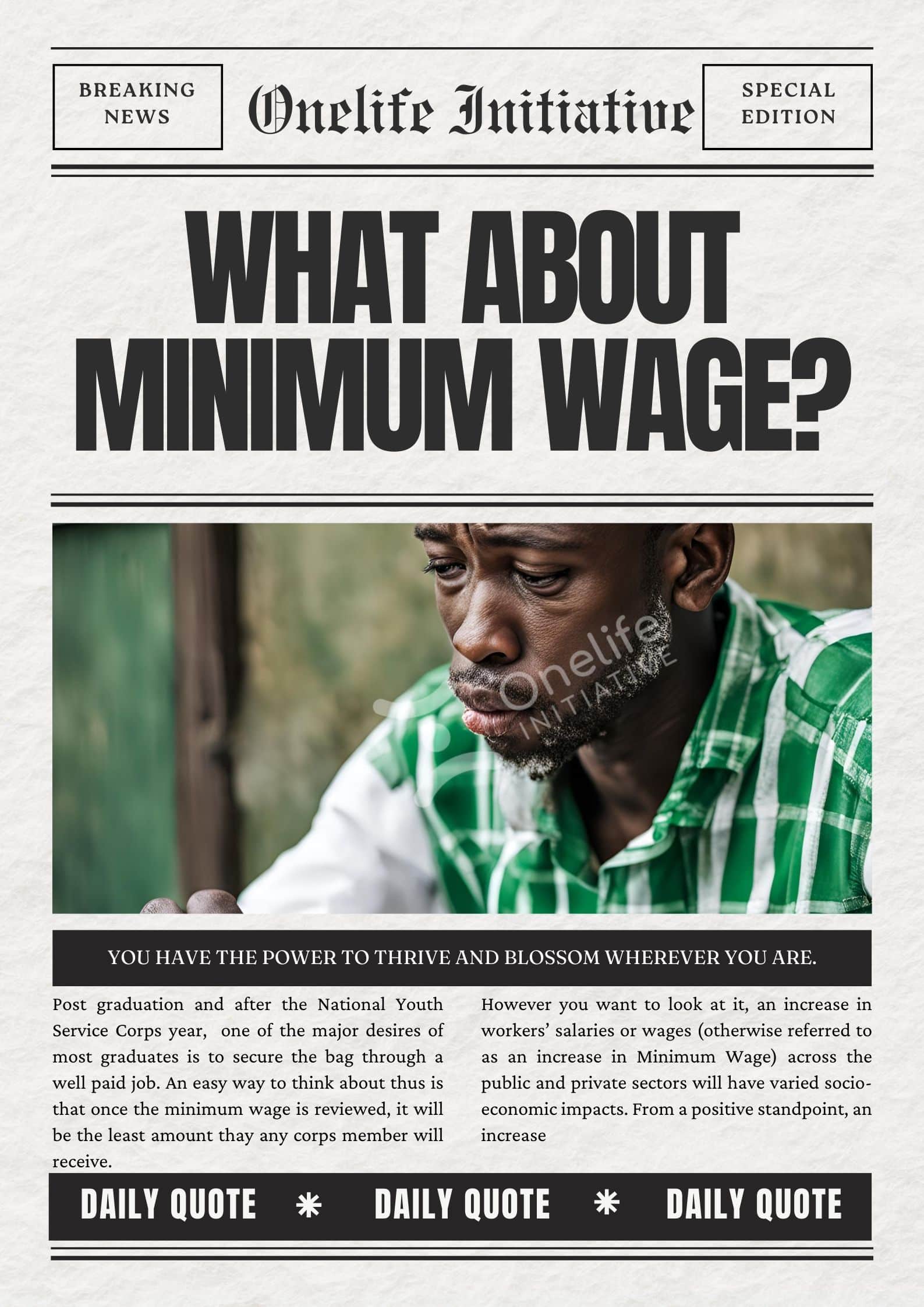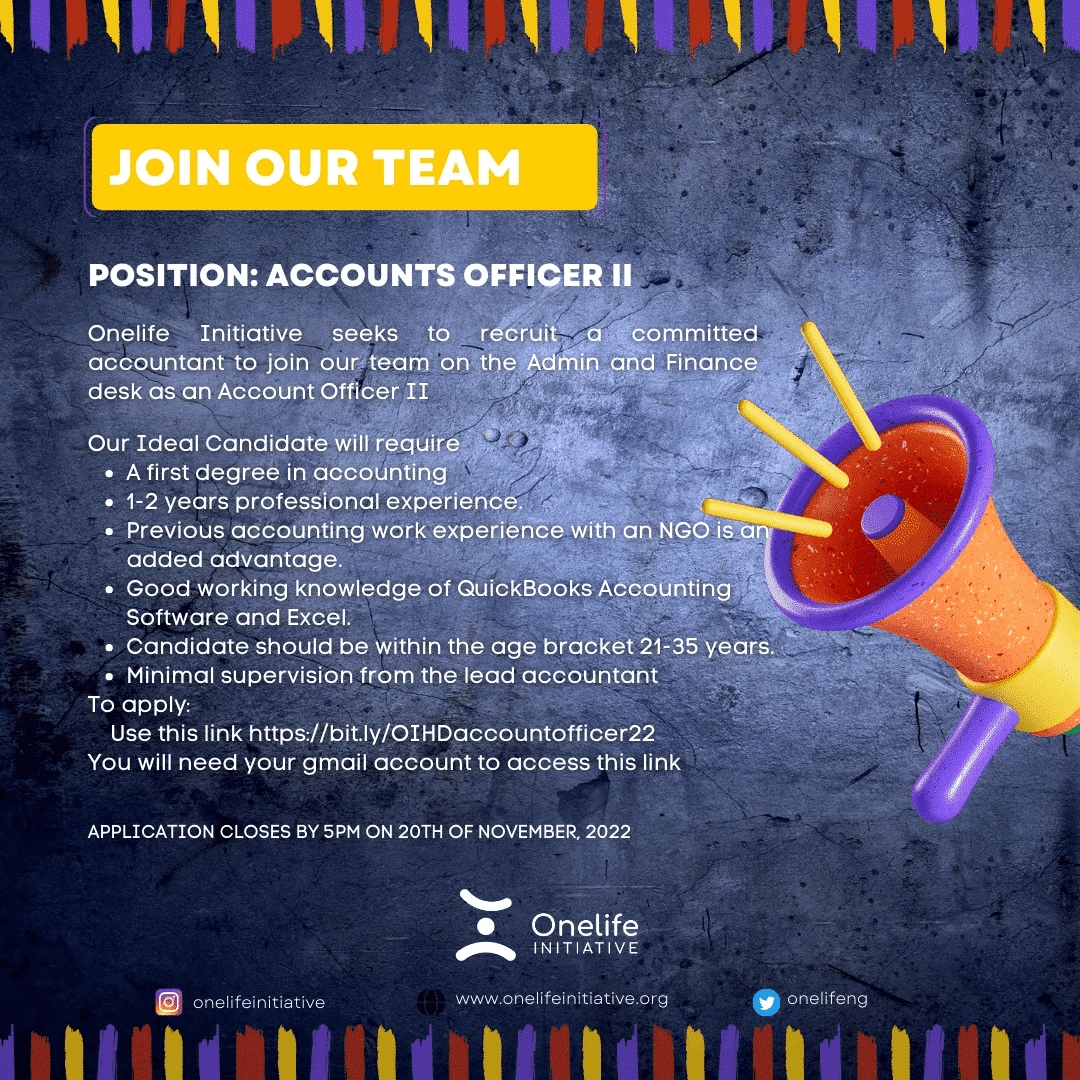Nigeria’s Minimum Wage: How it Affects You as a Young Person

Post graduation and after the National Youth Service Corps year, one of the major desires of most graduates is to secure the bag through a well paid job. An easy way to think about thus is that once the minimum wage is reviewed, it will be the least amount thay any corps member will receive.
However you want to look at it, an increase in workers’ salaries or wages (otherwise referred to as an increase in Minimum Wage) across the public and private sectors will have varied socio-economic impacts. From a positive standpoint, an increase in wages should help to improve the living conditions of workers, foster workers’ motivation, promote wealth creation and also prevent brain drain or loss of professionals and other highly skilled workers of a country to countries that pay mouthwatering salaries.
But the bad news is that an increase in the national minimum wage is often associated with incessant owing or halving of salaries (especially by State Governors) and spike inflation, among other challenges.
On May Day, 2024 – a day set aside to commemorate workers globally, the Minister of State for Labour, Nkeiruka Onyejeocha, revealed that the Federal Government approved a 25 per cent and 35 per cent salary increase for civil servants on the six consolidated salary structures.
But while this adjustment has been greeted with immense reactions from Nigerians, we have one question to ask; How well do you understand the concept of National Minimum Wage? This week, we will explore some of the major things you need to know about Nigeria’s minimum wage amidst the face off between government and the Nigeria Labour Congress and it’s allies.
Meaning of Minimum Wage
The minimum wage is the monthly salary that workers must receive in accordance with the minimum wage laws currently in effect in a country. It is the monthly wage that is considered adequate to provide a worker with the basic needs of life, such as clothing, food, shelter, education, medicine, and leisure, taking into account the country’s economic and cultural progress.
Brief History of Minimum Wage in Nigeria
The term “struggle” is a constant feature in nearly every conversation about the national minimum wage in Nigeria. The Nigeria Labour Congress (NLC) has consistently been at the forefront of this struggle, championing the cause for a fair and living national minimum wage for Nigerian workers. Although the history of minimum wage in Nigeria has its roots in the colonial era, it wasn’t until the establishment of NLC – an organised labour structure, that a formal and structured minimum wage was established for workers in the country.
In 1978, Comrade Hassan Sunmonu became the first president of the NLC, and because there was a pay rise for political leaders in the country at the time, Sunmonu was encouraged to mobilise his members to agitate (struggle) for a new minimum wage in 1981. The Sunmonu-led NLC demanded a NGN300 per month minimum wage. This led to a major strike which culminated in President Shehu Shagari and the NLC executives agreeing to a NGN125 per month pay package.
In 1989/90, another round of negotiations to demand higher wages for Nigerian workers took place under the leadership of Comrade Pascal Bafyau after succeeding Comrade Ali Chiroma. The negotiation, which was led by then deputy president of the NLC, Adams Oshiomole ended in a deadlock with the General Ibrahim Babangida-led military regime. After several warnings of a general strike, Gen. Babangida unilaterally decreed a NGN250 national minimum wage which was accepted by NLC (struggle).
Fast-forward between 1989 to 2001, the NLC went through a series of fierce struggles in the guise of strike actions to improve the minimum wage from NGN250 to NGN3000 (1981), from NGN5,500 to NGN7,500 (2001). The minimum wage was further increased to NGN18,000 by President Goodluck Johnathan in 2011 and NGN30,000 by President Muhammadu Buhari in 2019.
It took the relentless efforts of three NLC presidents after Bafyau – Adams Oshiomhole, Abdulwaheed Omar and Ayuba Wabba to achieve the current level of the nation’s minimum wage to date.
Things you should know about the National Minimum Wage
- It is the lowest salary or wage: Minimum wage is the lowest salary or wage permitted by law following negotiations between the labour union and government. In essence, the minimum wage sets a floor for how much an employer can pay their employees.
- It covers both private and public sectors: Minimum wage encompasses workers in both the private and public sectors, as private sector players are integral members of the country’s labour force. This means that the minimum wage payable by government agencies, private companies, or non-profit organisations. This is to ensure a universal standard for fair compensation and promote equity and consistency across the entire labour market.
- The NSIWC regulates it: In Nigeria, wages and salaries are determined and regulated by the National Salaries, Incomes and Wages Commission (NSIWC), which was established by Act 99 of 1993. This commission is responsible for reviewing, negotiating, and setting wage structures for all categories of workers in the public and private sectors.
- It focuses on protecting workers: Minimum wage aims to protect workers from exploitation and promote fair labour practices, recognising that a decent standard of living is a fundamental human right. By establishing a minimum wage, governments and labour unions strive to balance the needs of workers, employers, and the broader economy, seeking a fair and equitable distribution of wealth.
- It is subject to review every five years: According to the National Minimum Wage Act, 2019 signed by President Muhammadu Buhari, the national minimum wage must be reviewed after five years from the date of its enactment. Therefore, the review process should take place before the expiration of these five years. The current Act expired in March, 2024.
- There are exemptions: According to the Act, certain categories of workers are exempted from receiving the NMW as their monthly salary. Section 4 of the Act, states that the Act does not apply to workers who work on a part-time basis, commission rate, organisations with less than 25 employees, workers in seasonal employment like agriculture, and any person employed in a vessel or aircraft. These categories of workers are specifically exempted from the application of the national minimum monthly wage and employers can pay an amount agreed upon with the employees.
- Punishment: It is an offence for an employer to pay an amount less than the minimum wage to his/her workers. The Minimum Wage Act provides various punishments which include paying outstanding arrears. Predictably, employers may respond to this by downsizing.
How Countries Determine the National Minimum Wage
Setting a fair wage for workers in a country is more complex than considering what government and privately owned agencies or companies can afford. There are many other things to consider, like how expensive it is to live in different parts of the country and how many people are looking for jobs compared to how many jobs are available. Other factors include the government/organisation’s ability to pay and the prevailing market rate, which helps ensure wages are fair and competitive within a specific location.
In Nigeria, several key players are involved in deciding the country’s mandatory minimum wage rate. This includes the Minister of Labour and Employment, representing the government; the Nigerian Employers Consultative Association, representing employers; and the Nigerian Labour Congress (NLC) and Trade Union Congress (TUC) representing workers. These bodies form a negotiation committee to deliberate and negotiate a new wage rate based on some of the determining factors initially mentioned. Imagine it like a recipe with many ingredients; each factor, from the cost of living to worker productivity and the strength of unions, plays a role in determining a fair minimum wage that is considered a living wage for all workers.
In conclusion, the concept of minimum wage is a vital aspect of any economy, as it directly affects the lives of workers and their families. Nigeria’s journey with minimum wage has been a long and laborious one, with the Nigeria Labour Congress (NLC) playing a crucial role in championing the cause for a fair and living national minimum wage. It is essential to recognize the importance of a fair and competitive minimum wage in promoting economic growth, reducing poverty, and improving the overall standard of living. The ongoing negotiation for an increase in the current minimum wage by the Federal Government and leaders of the NLC and TUC appears to be a step in the right direction, but more needs to be done to strengthen the purchasing power of our currency which will guarantee an improved standard of living for Nigerian workers. By working together, we can build a more equitable and prosperous society for all.
The term “struggle” is a constant feature in nearly every conversation about the national minimum wage in Nigeria. The Nigeria Labour Congress (NLC) has consistently been at the forefront of this struggle, championing the cause for a fair and living national minimum wage for Nigerian workers




